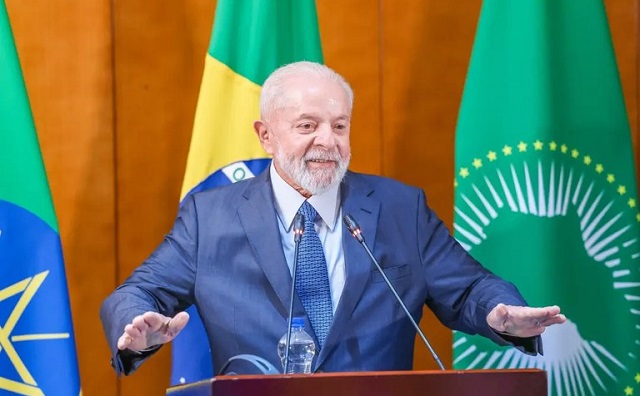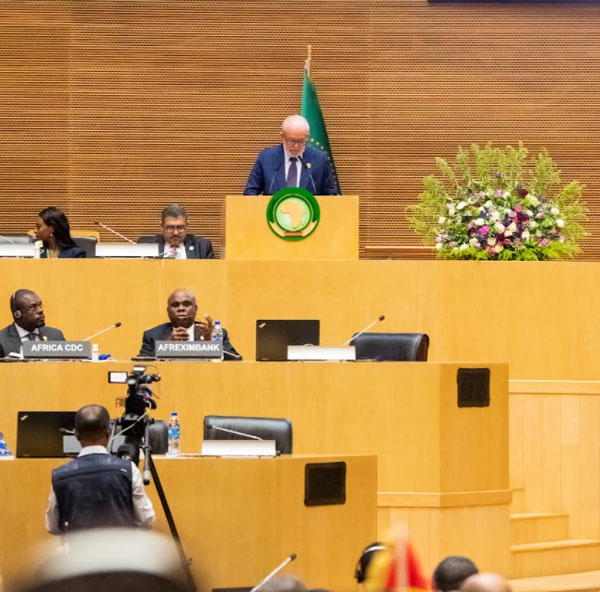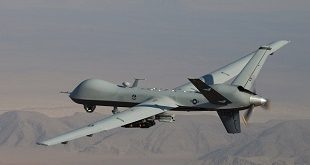
President Lula launches charm offensive with recent visit of continent
Addis Ababa, Ethiopia | RONALD MUSOKE | When it was the turn of Brazil’s President Luiz Inácio Lula da Silva to speak during the recently held assembly of African leaders at the African Union in the Ethiopian capital, Addis Ababa; he did so with both charm and verve.
Speaking as an invited guest during the opening session of the 37th Ordinary Session of the Assembly of the Heads of State and Government of the African Union held on Feb. 17, President Lula highlighted the historical, cultural and economic ties between Brazil and Africa.
President Lula said he was visiting the African continent for the 21st time and he had come to “reaffirm the partnership and bond between Brazil, its people and the sister continent.”
“The African struggle has a lot in common with the challenges faced by Brazil,” he said, adding that more than half of the 200 million Brazilian citizens identify as “Afro-descendants.”
And, although there is a 2500-kilometre water barrier which separates Brazil from Africa, Lula said, “Brazil and Africa have always been joined together geographically and are only separated by a “river” – the Atlantic Ocean.
“We, Africans and Brazilians, must chart our own paths within the emerging world order. We must create a new global governance that is capable of facing the challenges of our time.”
“It is unacceptable that a world capable of generating wealth in the order of US$ 100 trillion dollars per year still harbours the hunger of more than 735 million people. We are creating the Global Alliance against Hunger at the G20 so as to promote a set of public policies and mobilise resources to finance them.”
Lula told the attentive African leaders that with its 1.5 billion people coupled with its immense and rich territory, the continent has enormous possibilities for the future and Brazil wants to grow alongside Africa and it will do so “without dictating any paths.”
He said Brazil wants to partner with Africa in agriculture, climate change, education, industrial development as well as energy and digital transition.
“There is no reason as to why Africa which holds 400 million hectares of (arable) land spread across over 25 countries should not make the continent the breadbaskets of the world,” he said, “Let us collaborate so that Africa may become independent in its food and clean energy production.”
During his engagement with the media on Feb.18, President Lula said his latest trip to Africa had been one of his most important trips ever “because I was able to speak to almost all African countries at once.” He reiterated the historical, cultural and economic importance of Brazil’s roots in Africa. “Firstly, because I am aware—and I would like Brazil to be aware—that we have to have a preferential relationship with Africa.”
“Not only because Africa is part of our history, our culture, our way of being, our way of speaking, our way of singing, our colour, but also because Africa is an extraordinary place for the future to those who believe that the Global South will be the novelty of the 21st century in the new world economy,” he said.
Lula talked about Brazil’s contribution and the construction of a new world where Africa can resume its growth. He mentioned Brazil’s federal Mais Alimentos programme, which promotes food production and increases the productivity of family farming through financing and technical assistance.
According to Lula, the expansion of the programme to both Latin America and the African continent will be discussed. “Brazil wants to humbly bring to Africa something that we can bring: the experience of the success of Brazilian agriculture.
“Let’s discuss this to see if we can extend the ‘More Food’ (Mais Alimentos) programme to Africa, to Latin America, that is, so that countries can buy agricultural machinery and implements cheaper, with longer financing, so that we can increase the agricultural production of small and medium-sized producers,” he said.
“I also want to extend our partnership to the health sector. There is much to learn from both of our health strategies, and from the possibility of structuring robust and broad-reaching public systems.”
“We will work alongside the Africa Centres for Disease Control and Prevention to tackle neglected tropical diseases. We will aim to expand access to medicines, avoiding repetition of the vaccine “apartheid” that we saw in COVID-19.”
On the fight against climate change, the Brazilian leader noted that taking care of the health of the planet is one of his priorities. “The imperative of protecting the world’s two largest tropical rainforests—in the Amazon and the Congo basins—makes us protagonists in the climate agenda.”
However, he said, the current international instruments are insufficient to effectively reward the protection of forests, their biodiversity and the people who live in them, take care of them, and depend on them. “By recovering degraded areas, we can create a true green belt to protect forests in the Global South,” he said.

Alongside African partners, Lula said Brazil also wants to develop and construct a family of satellites to monitor deforestation. “To carry all this out, we are going to create a cooperation outpost with the African Union in sectors such as agricultural research, health, education, environment, and science and technology.”
To further buttress the partnership between Brazil and Africa, Lula said Brazil’s diplomatic representation in Addis Ababa would soon include staff from government bodies such as the Brazilian Cooperation Agency, EMBRAPA and FIOCRUZ, Brazil’s research and development bodies in agriculture and health.
“My friends, I want to close by saying that there is no Global South without Africa. Resuming Brazil’s rapprochement with Africa means recovering historical ties and contributing to the construction of a new, more just and supportive world order,” Lula said amidst applause from the African leaders.
President Lula who began his Africa visit via Egypt – where he took part in the extraordinary session of the League of Arab States, in Cairo, was accompanied by his ministers including; Mauro Vieira (Foreign Affairs); Wellington Dias (Development and Social Assistance, Family and the Fight Against Hunger); Luciana Santos (Science, Technology and Innovation); Anielle Franco (Racial Equality); Silvio Almeida (Human Rights and Citizenship); Vinícius Marques de Carvalho (Comptroller General of the Union); and Special Advisor, Audo Faleiro.
Lula’s real motive?
Experts on Brazil-Africa relations say President Lula’s “presidential diplomacy” in Africa intends to build on the efforts he began over two decades ago, in 2002, when he first became president and his policy on Africa was sustained by his predecessor, President Dilma Rousseff ,but suffered under President Jair Bolsonaro.
With the exception of Bolsonaro’s tenure, experts say, Brazil’s foreign policy makers have set out to make economic, political, and military cooperation with Africa, one of the country’s top priorities abroad, as part of Brazil’s emphasis on expanding relations with the Global South.
Already, there are efforts to strengthen economic, political and defence partnerships with Africa including a fast-growing South-South cooperation programme whose discourse stresses solidarity, as well as the promotion of Brazilian public policy experiments in areas such as agriculture, education and health.
Analysts say, not only does the government view the continent as a promising market for Brazilian investments and exports but it also looks to Africa as key political partners in Brazil’s quest to become a global player. And this was not lost on Lula during his address of his African counterparts in the Nelson Mandela auditorium at the African Union headquarters.
He said Brazil and Africa are now part of the economy of the Global South, and that these countries have the necessary resources and potential to contribute to the world economy.
“Now we are the economy of the Global South and we want to give ourselves a chance so that the Global South – which owns part of what the world needs today – can occupy its space in the global economy, politics and culture,” he said.
President Lula also highlighted the importance of the BRICS as an opportunity to strengthen the Global South’s influence. Lula believes that it is possible to include other African countries in the BRICS, as well as in the G20. “We think it is possible for other African countries to participate in the G20, but we are just getting started.”
Growing economic ties
According to the African Development Bank (AfDB), just about 4% of all Brazilian exports are destined for Africa. In 2021, Brazil-Africa trade reached US$ 16 billion, and this jumped nearly 40% in 2022 with Egypt being the top beneficiary of the growing trend in trade.
Brazil’s President Luiz Inacio Lula da Silva was in Angola last year for the Brazil-Angola Economic Forum, and in Sao Tome and Principe for the Community of Portuguese-speaking Countries Summit, where he reaffirmed his commitment to reignite Brazilian investment in Lusophone Africa.
In November, last year, an African Development Bank (AfDB) delegation to the 11th edition of the Brazil-Africa Forum stressed the need to strengthen collaboration with Brazil through the multi-partner “Lusophone Compact,” to attract more private capital and co-financing for private sector transactions.
The Lusophone Compact was launched in December, 2018, as a cooperative platform for investment between the AfDB Group, Portugal and six Portuguese-speaking countries (Angola, Cabo Verde, Equatorial Guinea, Mozambique and Sao Tome e Principe) with its objective being attracting substantial investments, designing bespoke solutions for small island states and unlocking private sector development and trade in, and among, the Lusophone countries.
The delegation from the continent’s premier multi-lateral development bank attended the forum held in Sao Paulo, Brazil from Oct.31-Nov.01, 2023, under the theme, “Investment and Development: Brazil and Africa Engaging with the World.”
At the forum, the AfDB organised and moderated investment round tables for potential investors. One session showcased three bankable projects in the sectors of transport and renewable energy in Angola, Mozambique and Sao Tome and Principe.
Nana Spio-Garbrah, the Manager of the Client Solutions Division at the AfDB, participated in the panel titled, “PPPs and Investments in Infrastructure and Logistics in the South Atlantic.” She emphasized the financial instruments including trade finance and political risk guarantees, available to mobilize international investors into Africa.
“There is no longer any excuse for savvy investors to shy away from the continent,” she said, “The synergies between the two regions are undeniable and the returns of investing in manufacturing or infrastructure whether aviation, ports or railway – are attractive.”
Going forward, President Lula said he was looking forward to meeting his African counterparts at the G20 Summit, in Rio de Janeiro, and at COP 30, in Belém in 2025. “The presence of the African Union as a full member of the G20 will be of great value but including more countries from the continent as full members is still also necessary.” “We have common agendas to defend,” he said.
 The Independent Uganda: You get the Truth we Pay the Price
The Independent Uganda: You get the Truth we Pay the Price



